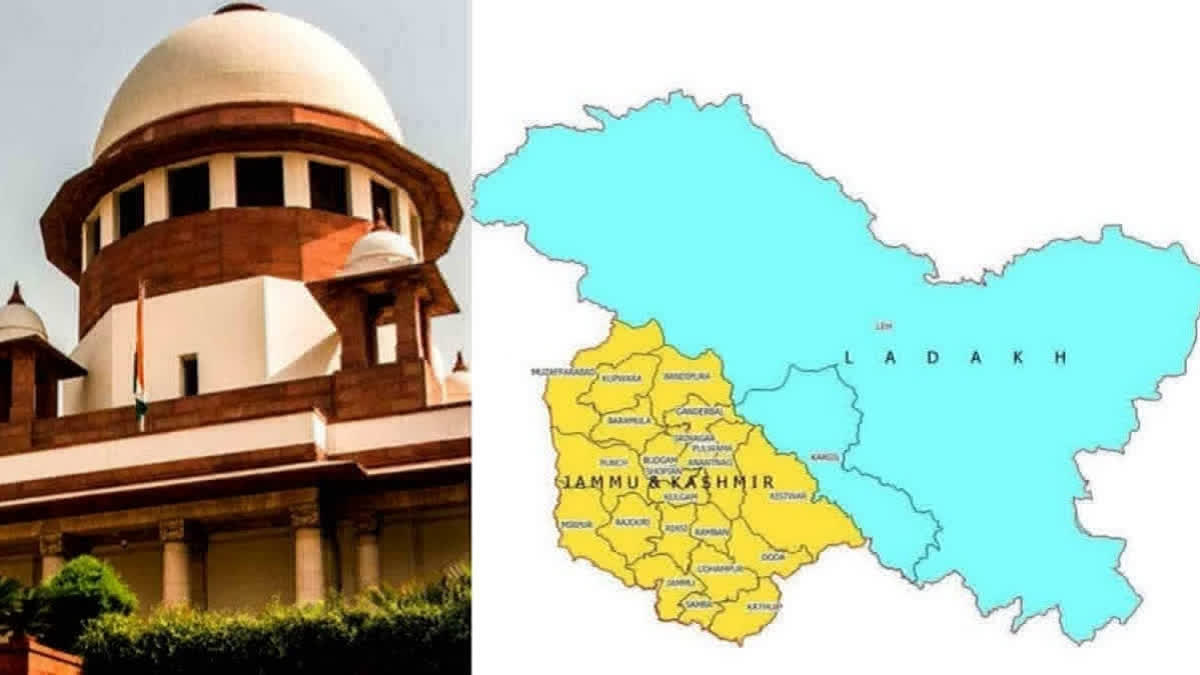New Delhi: The Supreme Court Monday upheld the abrogation of Article 370, which gave special status to the erstwhile state of Jammu and Kashmir, saying that Article 370 was a feature of asymmetric federalism and not sovereignty. The apex court said the people of Jammu and Kashmir do not exercise sovereignty in a manner which is distinct from the way in which the people of other states exercise their sovereignty.
A five-judge bench headed by Chief Justice of India D Y Chandrachud and comprising justices S K Kaul, Sanjiv Khanna, B R Gavai, and Surya Kant, heard the submissions in the matter for 16 days. All judges on the bench upheld the abrogation of Article 370, which gave special status to J&K. There are three judgments of the apex court – one authored by the CJI for himself, for Justice Gavai and Justice Surya Kant. There is a concurring opinion authored by Justice Kaul. Justice Sanjiv Khanna has concurred with both the judgments.
Justice Khanna said the judgment of CJI, is scholarly and it elaborately annotates the complex legal issues and the judgment authored by Justice Kaul pragmatically demystifies the factual and legal position.
Justice Khanna said Article 370 of the Constitution of India was a feature of asymmetric federalism and not sovereignty and Article 370 was enacted as a transitional provision and did not have a permanent character. “The abrogation of Article 370 does not negate the federal structure, as the citizens living in Jammu and Kashmir do and will enjoy the same status and rights as given to citizens residing in other parts of the country”, said Justice Khanna.
The CJI, who authored the majority judgment, said the state of Jammu and Kashmir does not retain any element of sovereignty after the execution of the Instrument of Accession (IoA) and the issuance of the Proclamation dated 25 November 1949 by which the Constitution of India was adopted. “The State of Jammu and Kashmir does not have ‘internal sovereignty’ which is distinguishable from the powers and privileges enjoyed by other States in the country. Article 370 was a feature of asymmetric federalism and not sovereignty”, said the CJI, in the 476-page judgment.
The CJI noted that democracy and federalism are basic features of the Constitution. “The division of legislative and executive competence between the Union and the federating States and the independence conferred on the federating States in their own sphere furthers representative democracy”, said the CJI.
The CJI said Article 1(1) indicates that the States are essential and indispensable to the constitutional structure of the country and the Union cannot exist without the existence of the states.
The CJI said the court is conscious that the constitutional powers of the state legislature are crucial facets of the principle of federalism. “These provisions create a space for the States to be seen and heard and for the States to have an equal say in the democratic functioning of the Nation. It is not only the letter of the law which makes a Constitution federal but also the exercise of such power”, said the CJI.
The CJI said if the position that Jammu and Kashmir has sovereignty by virtue of Article 370 were to be accepted, it would follow that other States which had special arrangements with the Union also possessed sovereignty. “This is clearly not the case. As noticed by this Court in other segments of this judgment, the special circumstances in Jammu and Kashmir necessitated a special provision, that is, Article 370”, said the CJI.
The CJI said Article 370 is an instance of asymmetric federalism. “The people of Jammu and Kashmir, therefore, do not exercise sovereignty in a manner which is distinct from the way in which the people of other States exercise their sovereignty. In conclusion, the State of Jammu and Kashmir does not have ‘internal sovereignty’ which is distinguishable from that enjoyed by other States”, said the apex court.
The bench said it is true that many commentators refer to these aspects of federalism as ‘internal sovereignty.’ By whatever name so called, it is clear that all States in the country have legislative and executive power albeit to differing degrees, it added.
“Articles 371A to 371J are examples of special arrangements for different States. This is nothing but a feature of asymmetric federalism, which Jammu and Kashmir too benefits from, by virtue of Article 370”, said the majority judgment.
The apex court said if the position that Jammu and Kashmir has sovereignty by virtue of Article 370 were to be accepted, it would follow that other States which had special arrangements with the Union also possessed sovereignty.
The apex court said in asymmetric federalism, a particular State may enjoy a degree of autonomy which another State does not. “The difference, however, remains one of degree and not of kind. Different states may enjoy different benefits under the federal setup but the common thread is federalism”, it said.
The apex court said it is important to refer to the Delhi agreement where it was decided that the State of Jammu and Kashmir shall have the residuary legislative powers because of the "consistent stand taken by the Constituent Assembly of Jammu and Kashmir” that sovereignty with respect to all matters other than those stipulated in the IoA continues to reside in the State. “This is not indicative of the sovereignty of Jammu and Kashmir. Residual legislative powers cannot be equated to residual sovereignty. It instead reflects the value of federalism and the federal underpinnings of the Constitution of India”, said the bench.
Also read:



